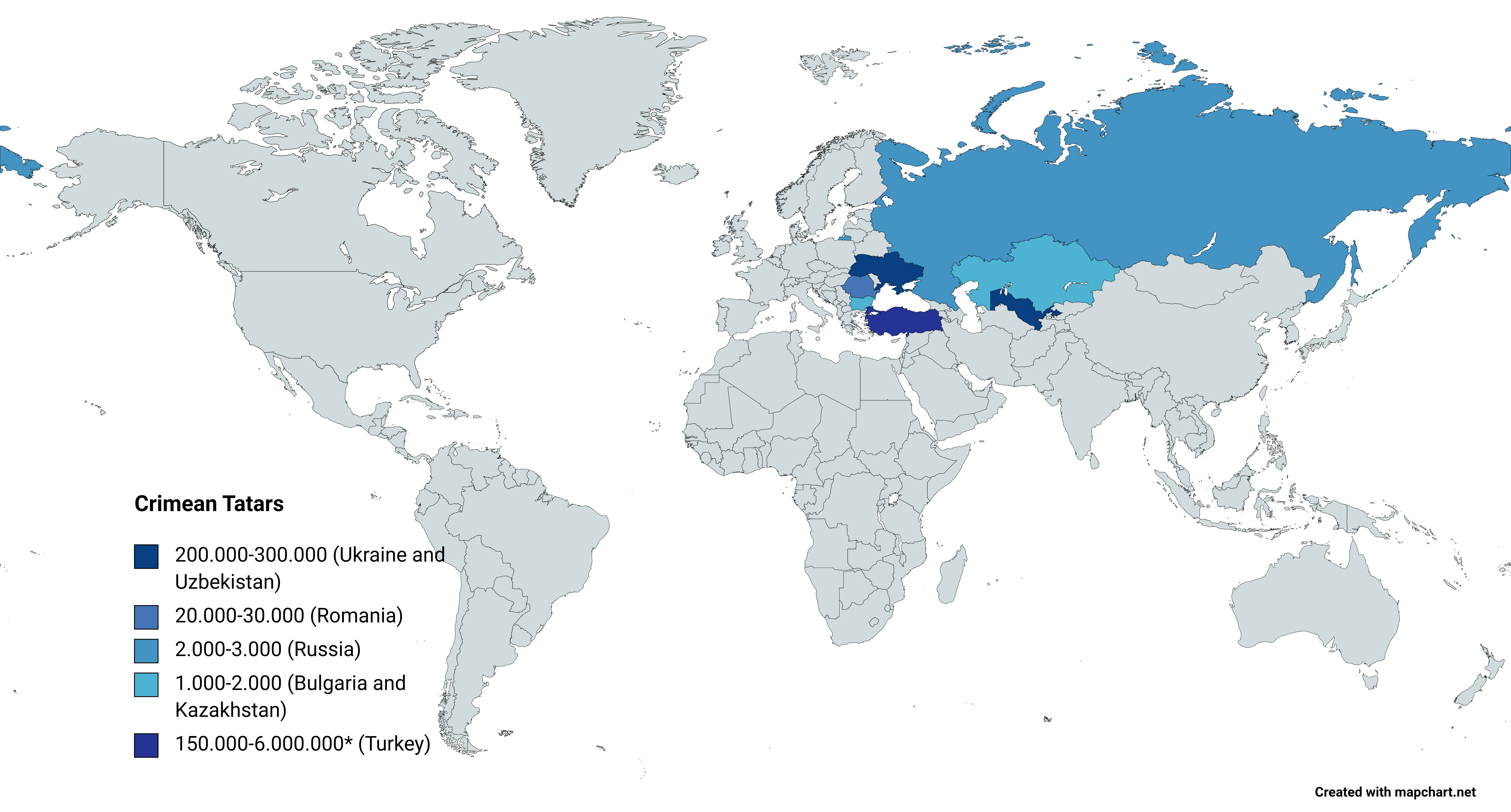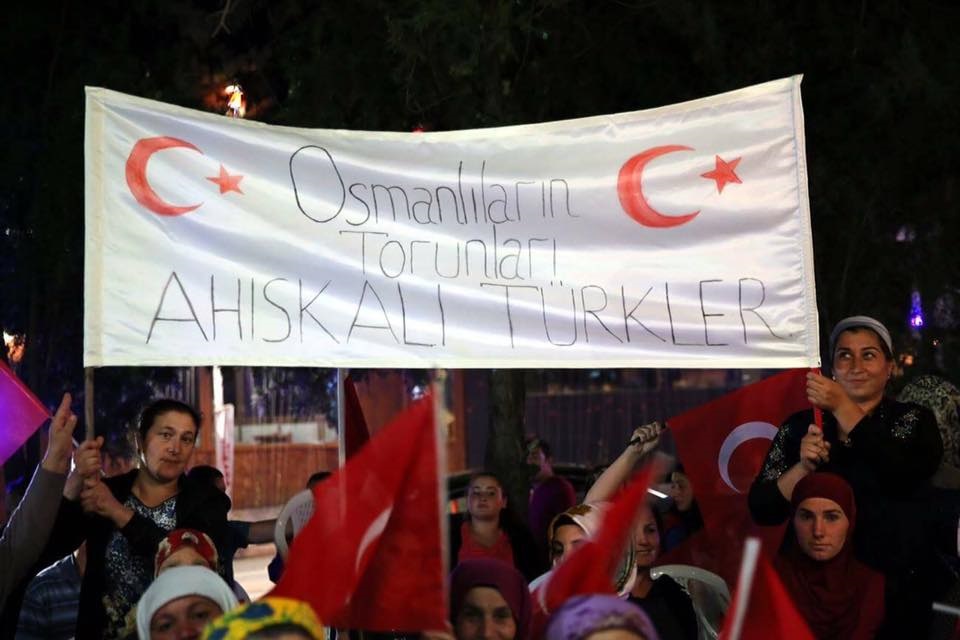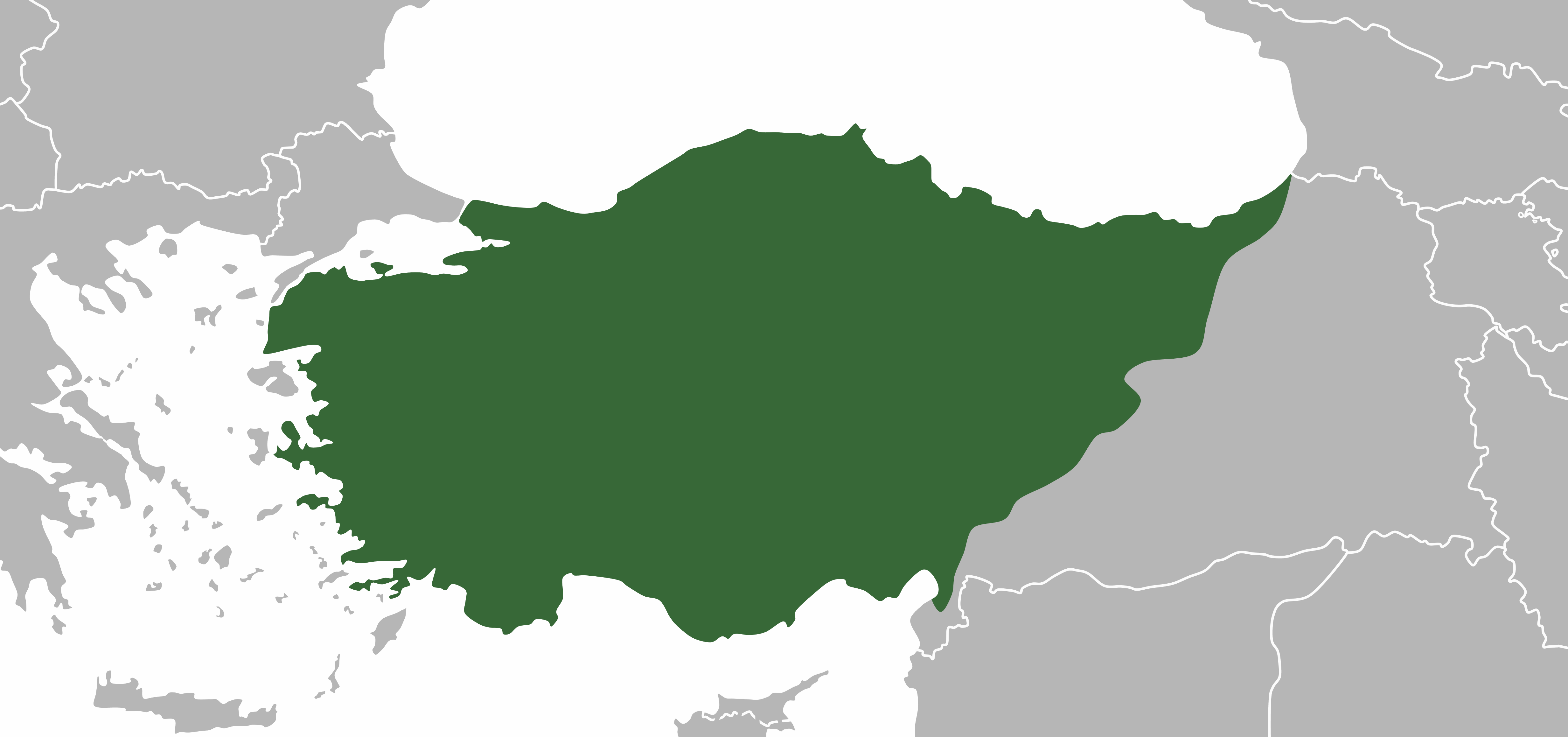|
Urums
Urums (, ; , ''Urúm''; Turkish and Crimean Tatar: ''Urum,'' ) are several groups of Turkic-speaking Greek Orthodox people native to Crimea. The emergence and development of the Urum identity took place from 13th to the 17th centuries. Bringing together the Crimean Greeks along with Greek-speaking Crimean Goths, with other indigenous groups that had long inhabited the region, resulting in a gradual transformation of their collective identity.Stearns 1971:7. History There are two main theories covering how the Urums may have originated. One hypothesis is that the Urums arose as a result of some Crimean Greeks converting to using the Crimean Tatar language. Another theory is that the Urums arose as a result of the adoption of Christianity by a group of Crimean Tatars. Some also speculate that the Urums from Crimea/Ukraine and Georgia have the same origins from Anatolia, with some even going as far to say that the two Urum groups speak the same language; however, the latter is ... [...More Info...] [...Related Items...] OR: [Wikipedia] [Google] [Baidu] |
Crimean Tatars
Crimean Tatars (), or simply Crimeans (), are an Eastern European Turkic peoples, Turkic ethnic group and nation indigenous to Crimea. Their ethnogenesis lasted thousands of years in Crimea and the northern regions along the coast of the Black Sea, uniting Mediterranean basin, Mediterranean populations with those of the Eurasian Steppe.''Агджоян А. Т., Схаляхо Р. А., Утевская О. М., Жабагин М. К., Тагирли Ш. Г., Дамба Л. Д., Атраментова Л. А., Балановский О. П.'Генофонд крымских татар в сравнении с тюркоязычными народами Европы, 2015 Genome-wide study of the Crimean Tatars unveiled connections between them and the genomes of individuals from the Steppe during the Bronze Age, specifically those associated with the Yamnaya culture, Yamnaya archaeological culture. Until the 20th century, Crimean Tatars were the most populous demographic cohort ... [...More Info...] [...Related Items...] OR: [Wikipedia] [Google] [Baidu] |
Tsalka Language
Tsalka is an East-Anatolian dialect of Turkish spoken by Tsalka Greeks who mainly inhabit the Tsalka and Tetritsqaro municipalities in Georgia. Sociolinguistic status Not all Tsalka Greeks speak Tsalka; there are many Pontic Greek speakers. Tsalka is exclusively a spoken language and has no writing system. The name Tsalka language is not used by its speakers; instead, they use descriptive terms like "bizim dili" ("our language"). Tsalka Greeks also call their language Musulmandzha (the Muslim language) and often identify as Urums as a result of the belief that people's ethnic identity is defined by the genetic relationships of their language; this view was heavily promoted by the Soviet bureaucracy. At the same time, they are offended by the claim that they are not real Greeks because of the Turkish influence. According to Garkavets, Orthodox Mariupol Urums who also speak a Turkish dialect have no similar insecurity in relation to their language. Speaking Tsalka is not prest ... [...More Info...] [...Related Items...] OR: [Wikipedia] [Google] [Baidu] |
Meskhetian Turks
Meskhetian Turks, also referred to as Turkish Meskhetians, Ahiska Turks, and Turkish Ahiskans, (; ka, მესხეთის თურქები ''Meskhetis turk'ebi'') are a subgroup of ethnic Turkish people formerly inhabiting the Meskheti region of Georgia, along the border with Turkey. The Turkish presence in Meskheti began with the Ottoman military expedition of 1578, although Turkic tribes had settled in the region as early as the eleventh and twelfth centuries. Today, the Meskhetian Turks are widely dispersed throughout the former Soviet Union (as well as in Turkey and the United States) due to forced deportations during World War II. At the time, the Soviet Union was preparing to launch a pressure campaign against Turkey, and Joseph Stalin wanted to clear the strategic Turkish population in Meskheti deemed likely to be hostile to Soviet government intentions.. In 1944, the Meskhetian Turks were accused of smuggling, banditry and espionage in collaboration wit ... [...More Info...] [...Related Items...] OR: [Wikipedia] [Google] [Baidu] |
Ukrainian Greeks
Ukrainian Greeks are a Greek minority that reside in or used to reside in the territory of modern Ukraine. The majority of Ukrainian Greeks live in Donetsk Oblast and are particularly concentrated around the city of Mariupol. According to the 2001 Ukrainian Census, there were 91,548 ethnic Greeks in Ukraine, or 0.2% of the population. However, the actual percentage of those with Greek ancestry is likely to be much higher due to widespread intermarriage between ethnic Greeks and those Ukrainian citizens who are Ukrainian Orthodox, particularly in eastern Ukraine, as well as the absence of strong links to Greece or use of the Greek language by many with Greek ancestry in these areas and who therefore are not classified as Greeks in official censuses. Most Greeks in Ukraine belong to the larger Greek diaspora known as Pontic Greeks. But there are also a small recent group of Greek expats and immigrants to Ukraine. History A Greek presence throughout the Black Sea area existed l ... [...More Info...] [...Related Items...] OR: [Wikipedia] [Google] [Baidu] |
Urum Language
Urum (, ) is a Turkic language spoken by several thousand ethnic Greeks who inhabit a few villages in southeastern Ukraine. Over the past few generations, there has been a deviation from teaching children Urum to the more common languages of the region, leaving a fairly limited number of new speakers. The Urum language is often considered a variant of Crimean Tatar. Name and etymology The name '' Urum'' is derived from ''Rûm'' 'Rome', the term for the Byzantine Empire in the Muslim world. The Ottoman Empire used it to describe non-Muslims within the empire. The initial vowel in Urum is prothetic. Turkic languages originally did not have in word-initial position, and so in borrowed words they used to add a vowel before it. The common use of the term ''Urum'' appears to have led to some confusion, as most Turkish-speaking Greeks were called Urum. The Turkish-speaking population in Georgia is often confused with the distinct community in Ukraine. Classification Urum is a ... [...More Info...] [...Related Items...] OR: [Wikipedia] [Google] [Baidu] |
Pontic Greeks
The Pontic Greeks (; or ; , , ), also Pontian Greeks or simply Pontians, are an ethnically Greek group indigenous to the region of Pontus, in northeastern Anatolia (modern-day Turkey). They share a common Pontic Greek culture that is distinguished by its music, dances, cuisine, and clothing. Folk dances, such as the Serra (also known as ''Pyrrhichios''), and traditional musical instruments, like the Pontic lyra, remain important to Pontian diaspora communities. Pontians traditionally speak Pontic Greek, a modern Greek variety, that has developed remotely in the region of Pontus. Commonly known as ''Pontiaka'', it is traditionally called '' Romeika'' by its native speakers. The earliest Greek colonies in the region of Pontus begin in 700 BC, including Sinope, Trapezus, and Amisos. Greek colonies continued to expand on the coast of the Black Sea (''Euxeinos Pontos'') between the Archaic and Classical periods. The Hellenistic Kingdom of Pontus was annexed by Ro ... [...More Info...] [...Related Items...] OR: [Wikipedia] [Google] [Baidu] |
Rūm
Rūm ( , collective; singulative: ''Rūmī'' ; plural: ''Arwām'' ; ''Rum'' or ''Rumiyān'', singular ''Rumi''; ), ultimately derived from Greek Ῥωμαῖοι (''Rhomaioi'', literally 'Romans'), is the endonym of the pre-Islamic inhabitants of Anatolia, the Middle East and the Balkans and date to when those regions were parts of the Eastern Roman Empire. The term ''Rūm'' is now used to describe: *The city of Rome in Italy, and the people living in it. * Remaining pre-Islamic ethnocultural Christian minorities living in the Near East and their descendants, notably the Antiochian Greek Christians who are members of the Greek Orthodox Church of Antioch and the Melkite Greek Catholic Church of Syria, Lebanon, Jordan, Israel, Palestine, and the Hatay Province in Southern Turkey whose liturgy is still based on Koine Greek. * Orthodox Christian citizens of modern Turkey originating in the pre-Islamic peoples of the country, including Pontians from the Black Sea mountains in t ... [...More Info...] [...Related Items...] OR: [Wikipedia] [Google] [Baidu] |
Caucasian Greeks
The Caucasus Greeks ( or more commonly , ), also known as the Greeks of Transcaucasia and Russian Asia Minor, are the ethnic Greeks of the North Caucasus and Transcaucasia in what is now southwestern Russia, Georgia, and northeastern Turkey. These specifically include the Pontic Greeks, though they today span a much wider region including the Russian north Caucasus, and the former Russian Caucasus provinces of the Batum Oblast and the Kars Oblast (the so-called ''Russian Asia Minor''), now in north-eastern Turkey and Adjara in Georgia.Mikhailidis, Christos & Athanasiadis, Andreas, Introduction. Greek people migrated into these areas well before the Christian/Byzantine era. Traders, Christian Orthodox scholars/clerics, refugees, mercenaries, and those who had backed the wrong side in the many civil wars and periods of political in-fighting in the Classical/Hellenistic and Late Roman/Byzantine periods, were especially represented among those who migrated. One notable example is t ... [...More Info...] [...Related Items...] OR: [Wikipedia] [Google] [Baidu] |
Greece
Greece, officially the Hellenic Republic, is a country in Southeast Europe. Located on the southern tip of the Balkan peninsula, it shares land borders with Albania to the northwest, North Macedonia and Bulgaria to the north, and Turkey to the east. The Aegean Sea lies to the east of the Geography of Greece, mainland, the Ionian Sea to the west, and the Sea of Crete and the Mediterranean Sea to the south. Greece has the longest coastline on the Mediterranean Basin, spanning List of islands of Greece, thousands of islands and nine Geographic regions of Greece, traditional geographic regions. It has a population of over 10 million. Athens is the nation's capital and List of cities and towns in Greece, largest city, followed by Thessaloniki and Patras. Greece is considered the cradle of Western culture, Western civilisation and the birthplace of Athenian democracy, democracy, Western philosophy, Western literature, historiography, political science, major History of science in cl ... [...More Info...] [...Related Items...] OR: [Wikipedia] [Google] [Baidu] |
Greeks
Greeks or Hellenes (; , ) are an ethnic group and nation native to Greece, Greek Cypriots, Cyprus, Greeks in Albania, southern Albania, Greeks in Turkey#History, Anatolia, parts of Greeks in Italy, Italy and Egyptian Greeks, Egypt, and to a lesser extent, other countries surrounding the Eastern Mediterranean and Black Sea. They also form a significant Greek diaspora, diaspora (), with many Greek communities established around the world.. Greek colonies and communities have been historically established on the shores of the Mediterranean Sea and Black Sea, but the Greek people themselves have always been centered on the Aegean Sea, Aegean and Ionian Sea, Ionian seas, where the Greek language has been spoken since the Bronze Age.. Until the early 20th century, Greeks were distributed between the Greek peninsula, the western coast of Asia Minor, the Black Sea coast, Cappadocia in central Anatolia, Egypt, the Balkans, Cyprus, and Constantinople. Many of these regions coincided to ... [...More Info...] [...Related Items...] OR: [Wikipedia] [Google] [Baidu] |
Crimean Karaites
Crimean Karaites or simply Karaites (Crimean Karaim language, Karaim: Кърымкъарайлар, ''Qrımqaraylar'', singular къарай, ''qaray''; Trakai dialect: ''karajlar'', singular ''karaj''; ; ; ), also known more broadly as Eastern European Karaites, are a traditionally Turkic languages, Turkic-speaking Jews, Judaic ethnoreligious group native to Crimea. Nowadays, most Karaim in Eastern Europe speak the dominant local language of their respective regions. The Karaite religion, known in Eastern Europe as Karaism, split from mainstream Rabbinical Judaism in the 19th and 20th centuries, though differences date back to the 12th century. They have lived alongside Krymchaks. Most Karaites in the region do not consider themselves to be Jews, associating the ethnonym with Rabbinical Jews alone, but rather consider themselves to be descendants of the Khazars, Jewish schisms, non-Rabbinical Judeans, or other Turkic peoples. Research into the origins of the Karaites indicates t ... [...More Info...] [...Related Items...] OR: [Wikipedia] [Google] [Baidu] |
Anatolia
Anatolia (), also known as Asia Minor, is a peninsula in West Asia that makes up the majority of the land area of Turkey. It is the westernmost protrusion of Asia and is geographically bounded by the Mediterranean Sea to the south, the Aegean Sea to the west, the Turkish Straits to the northwest, and the Black Sea to the north. The eastern and southeastern limits have been expanded either to the entirety of Asiatic Turkey or to an imprecise line from the Black Sea to the Gulf of Alexandretta. Topographically, the Sea of Marmara connects the Black Sea with the Aegean Sea through the Bosporus and the Dardanelles, and separates Anatolia from Thrace in Southeast Europe. During the Neolithic, Anatolia was an early centre for the development of farming after it originated in the adjacent Fertile Crescent. Beginning around 9,000 years ago, there was a major migration of Anatolian Neolithic Farmers into Neolithic Europe, Europe, with their descendants coming to dominate the continent a ... [...More Info...] [...Related Items...] OR: [Wikipedia] [Google] [Baidu] |








